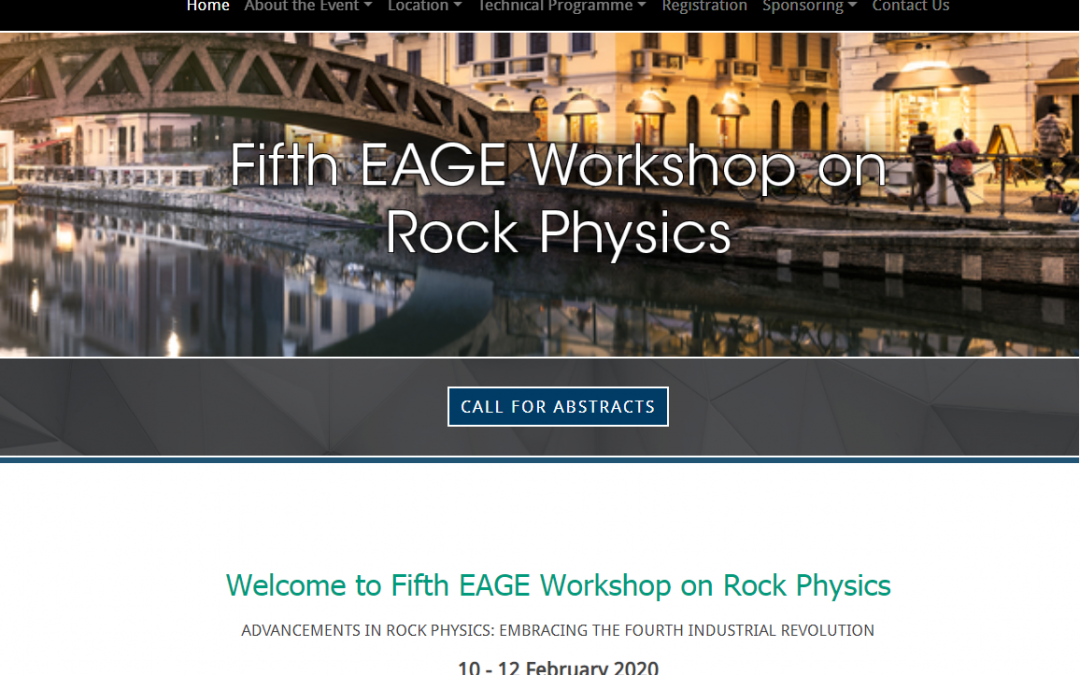I membri della Sezione Italiana sono invitati a presentare abstract per il quinto EAGE Workshop on Rock Physics che si terrà a Milano dal 10 al 12 febbraio 2020. La deadline è il 30 settembre 2019.
Maggiori informazioni al link: https://eage.eventsair.com/rock-physics-2019/event-overview
Fifth EAGE Workshop on Rock Physics
Following the success of the previous editions held in Dubai 2012, Oman 2014, Istanbul 2016 and Abu Dhabi 2017, EAGE is planning a fifth Rock Physics workshop to take place in Milan from 10 – 12 February 2020. Through the understanding and theoretical tools Rock Physics provides, this workshop has historically offered a great platform and opportunity to gain insight on the recent advances in rock physics modelling and its applications in exploration, development and reservoir monitoring.
As rock physics becomes an ever more important part of integrated modelling and interpretation workflows, this fifth edition of the workshop will focus on the interaction with other disciplines and geophysical domains, as well as on some key trending aspects in rock physics modelling such as anisotropy, uncertainty and modelling of tight and fractured rocks.
The programme already boasts an inspired layout of the seven technical sessions we wish to focus on:
-
Topics
Geomechanics + Pore Pressure Prediction
The stresses imposed on a rock have an important control on the production and depletion of a reservoir. In this section, we invite submissions that describe research or case studies to understand: (a) the influence of pressure and stress on the rock’s elastic properties, or, (b) how the elastic properties can be used to characterize the stress state of the reservoir.
Unconventional Resources
The exploration and development of unconventional resources, such as shale and tight sands, encounter several challenges including: reservoir characterization, fractures initiation and monitoring, well bore integrity and anisotropy. We seek contributions that focus on the role of rock physics in tackling the above challenges and aim to improve our understanding of the transport and elastic properties of shale/tight sand. Theoretical, experimental and digital rock physics investigation as well as field-scale studies are all welcomed.
Artificial Intelligence / Machine Learning
With the rise of the 4th industrial revolution, there has been a tremendous development in AI science and new ML technique being are introduced periodically. Therefore, it is inevitable for these techniques to be utilized in rock physics due to the vast amounts of data acquired and the increased reservoir complexity with number of the rock physics models and their applications. We seek contributions that showcase the utilization of AI techniques that can optimize and improve the results of the rock physics analysis, increase interpretational efficiency, as well as reduce the risk associated with prospect generation.
Integration of Multi-Physical Data
Rock physics provides an important link between multiphysical data sets, both in the context of joint inversion and joint interpretation. We solicit contributions that integrate various data sets, including seismic, EM, gravity and magnetics, to reduce the interpretation uncertainty and exploit the synergies that the complementary data sets offer.
Quantitative Seismic Interpretation & Uncertainty
Quantitative Seismic Interpretation (QSI) methods utilizes rock physics to link the reservoir properties to the seismic data and also aims in quantifying the associated reservoir uncertainties (i.e., rock type, fluid content, etc.) by utilizing probabilistic or statistical methods. These methods allow us to integrate different data types and model scenarios not necessarily encountered in the wells, which in turn, will help in reducing the risk associated with the uncertainties prior to drilling new wells. In this section, we invite submissions showcasing the quantification of uncertainties and its impact on exploration decisions.
Experimental Rock Physics
This session seeks abstracts that discuss the use of experimental geophysical techniques such as velocity and conductivity measurements for the characterization of the petrophysical and the geomechanically properties of rocks and their effect on formation stress and rock-fluid interactions. We also encourage abstract submittions that combines laboratory measurements for building inversion models and upscaling scheme.
EOR and Time-Lapse Rock PhysicsOne critical aspect of reservoir management is understanding the formation behavior during production. When enhanced oil recovery techniques such surfactant or gas injection or even steam in the case of heavy oil are used, the changes in saturation and pore fluid pressure for example affects fluid properties and the fluid-rock interactions. Tracking such changes using time-lapse geophysical methods have shown promising aspects in monitoring the reservoir performance. In this session, we seek contribution from the technical communities to present successful cases using conventional and advanced geophysical techniques in addition how machine learning can help maximizing the value of time-lapse datainterpretation.
And one of the highlighted sessions we can look forward to will also look ahead at how Artificial Intelligence and Machine Learning techniques will impact the current industry practices and help overcome some of the key challenges faced by the rock physics community. The technical committee welcome you to submit your paper on case studies or technologies on the above listed topics.


Trovate qui il programma tecnico https://az659834.vo.msecnd.net/eventsairwesteuprod/production-eage-public/0b7816736acc4c22a9ca4e521d5598d7